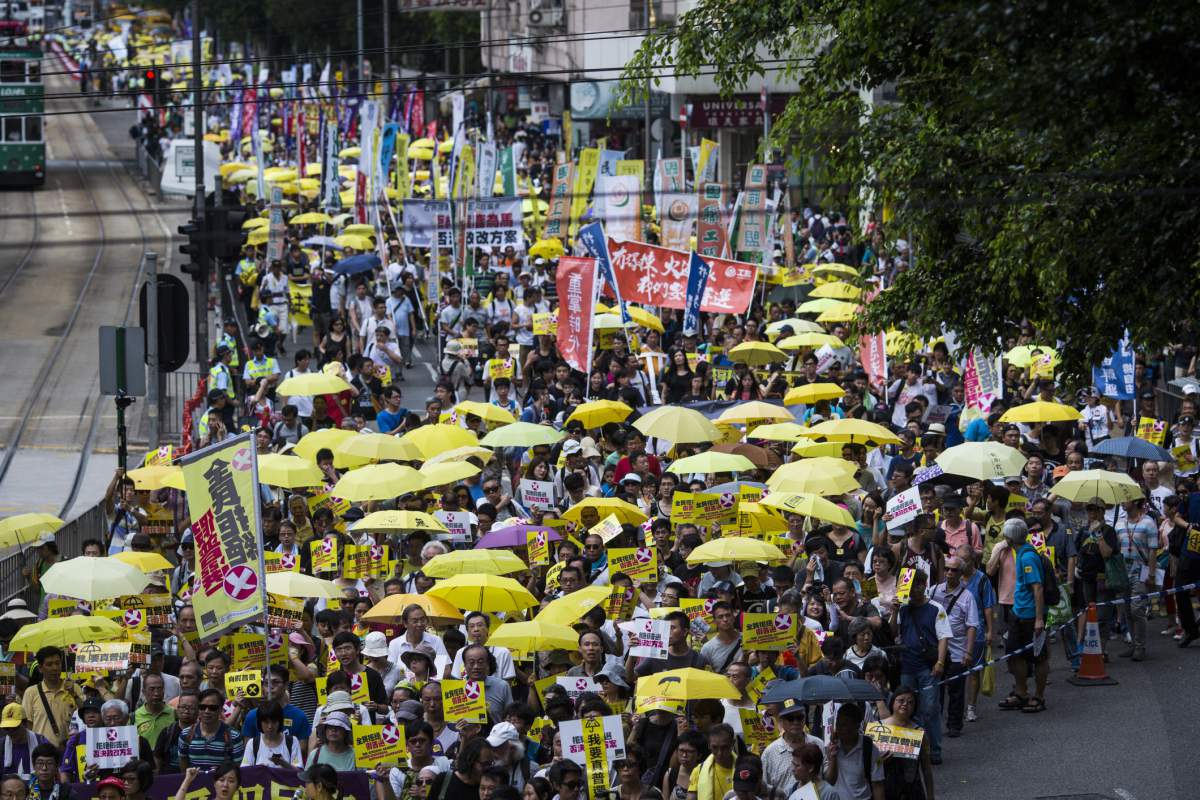Just ahead of the Legislative Council vote on electoral reforms, protesters have again taken to the Hong Kong streets, though in much smaller numbers than during last year’s Occupy Central demonstrations, which opposed the proposed reforms that require all candidates for chief executive to be pre-screened by a pro-Beijing panel. Joanna Plucinska of TIME reports:
A crowd of 2,000 to 3,000 people—workers and families as well as students and democracy activists—marched on Sunday afternoon from Victoria Park, a traditional gathering place for protests, to the legislature buildings downtown. Many carried yellow umbrellas—adopted as the symbol of Hong Kong’s democracy movement after protesters took to carrying them during last year’s unrest to protect themselves from police pepper spray.
Others carried signs that read “Citizens Against Pseudo-Universal Suffrage,” declaring their opposition to the form of democracy described in a political reform bill to be voted on by the city’s legislature on June 17. That bill will allow the central government in Beijing, and a 1,200 member electoral college composed mostly of pro-establishment figures, to vet all candidates for the position of Chief Executive, as the city’s top official is known. Similarly unrepresentative electoral methods helped to spark last fall’s Umbrella Revolution, and protesters are once again demanding broader political rights. [Source]
Despite Beijing’s support, the proposal is expected to be blocked by pro-democracy legislators, Chao Deng reports for the Wall Street Journal:
Opposition lawmakers have enough votes to block the package on June 17 and demonstrators are expected to lobby lawmakers at discussion forums throughout the week.
“If we don’t vote down, [the government] will have no incentive to change,” said Alan Leong, leader of pro-democracy political party Civic Party. “We would end up worse by pocketing the proposal” because China could tell the world that “they’ve already delivered.” [Source]
From Phila Siu, Samuel Chan and Tony Cheung at the South China Morning Post:
The debate in Legco starts on Wednesday and all 27 pan-democratic lawmakers say they will reject the package, denying the government the two-thirds majority needed for the reform to pass.
Yesterday’s rally was the first of a series of actions by the coalition. There will be nightly assemblies outside Legco until the vote. But organisers have no plans to repeat the blockades of the 79-day Occupy movement last year.
Protesters were confident the proposal would be rejected and were not worried about reports of a mystery man trying to bribe League of Social Democrats lawmaker “Long Hair” Leung Kwok-hung into voting for the proposal.
Along the route, protesters traded insults with about two dozen supporters of the proposals for the 2017 chief executive election. They branded the pro-democracy marchers “running dogs of Western imperialists” while displaying placards saying “genuine” universal suffrage was a false notion. [Source]
Polls last week show a shift in public opinion, with a slim majority now opposed to the proposed reforms. From Alan Wong at the New York Times:
The vote this week will end months of political debate over whether to accept what critics of the plan see as a failure to provide what they call a meaningful “one person, one vote” election. On Friday, a widely cited poll on the proposed changes conducted by three Hong Kong universities showed for the first time that the number of respondents opposed to the plan exceeded those in favor of it, by a two percentage-point margin, which likely falls within the poll’s margin of sampling error.
The poll, conducted on a rolling basis since late April by the University of Hong Kong, Polytechnic University and the Chinese University of Hong Kong, includes about 1,000 respondents and has a margin of sampling error of plus or minus three percentage points.
To get the two-thirds majority in the Legislative Council needed to pass the proposal into law, the Hong Kong government needs to coax at least four of the pro-democratic legislators to vote for it. In talks leading up to the vote so far, the government has failed to convince even one of them to change their mind. [Source]
It is unclear how much momentum a new protest movement will gain, as some participants in last fall’s protests remain divided over the tactics and goals of the movement—a division which was made evident by splintered commemorations of June 4th.
Nine radical activists were detained Monday after powerful explosives were found in their possession, in what police believe may have been an attack planned ahead of the LegCo vote. Clifford Lo at the South China Morning Post reports:
The highly unstable explosives, known as TATP, were seized at the vacant former ATV studio in Sai Kung in the early hours of this morning by the police bomb squad, which carried out a controlled explosion at the site.
The discovery was swiftly followed by the arrest of five men and four women from Hong Kong, aged 21 to 34, in a series of raids across the city by the force’s elite Organised Crime and Triad Bureau.
The suspects include a post-secondary student, a teaching assistant, a construction worker, a technician, and three unemployed people, a police source said. The nine suspects are core members of a localist radical group, which had discussed launching a bomb attack online, according to the source. [Source]








